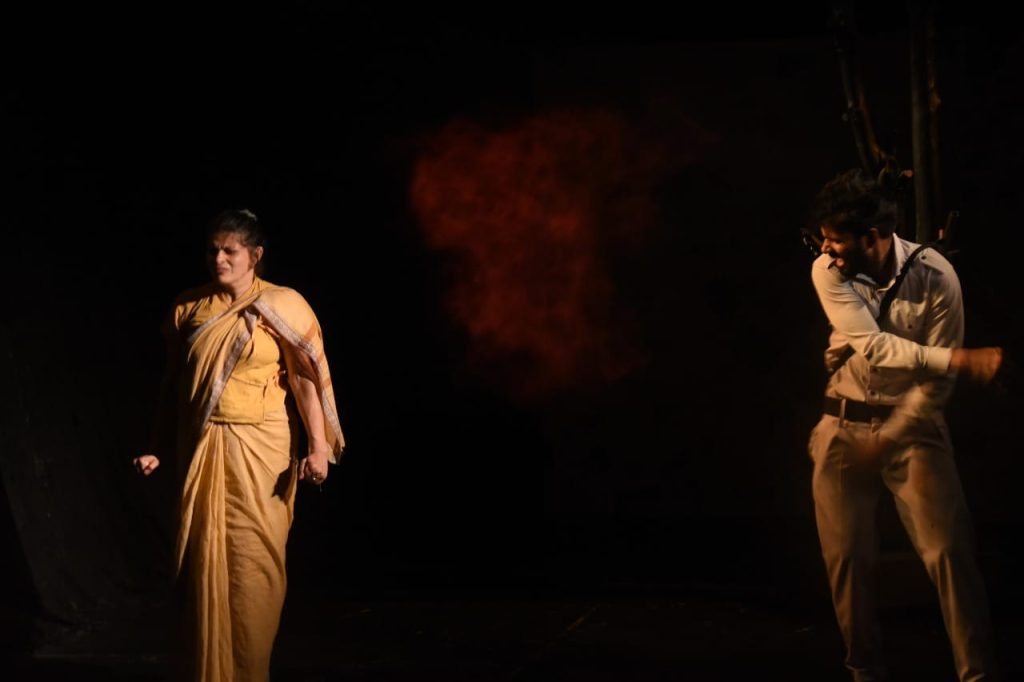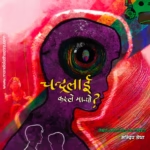Nepali theatre is on the move.
New theatres are built, new theatre groups and companies are being established, more and more acting trainings are offered, even long-term trainings are designed, plays and theatre events also get recognized in politics and media.
Social transformation, to end any kind of discrimination based on gender, age, caste, ethnicity, disabilities or social status and to promote equal access has become even more important also inside the theatre movement.
Workshops on different theatre forms and skills are offered. Mostly, youth are engaged with innovative projects, initiatives and movements related to theatre.
I started to work in Nepal in 2018, contributing as a theatre practitioner, artist and peace advisor in the frame of the Civil Peace Service with Mandala Theatre Nepal as a partner organization. During the five years of my experience in Nepal, I got the opportunity to get to know many Nepali theatre practitioners, groups and artists as well as activists for social transformation and peace building, all dedicated and all enthusiastic.
A month-long follow up workshop for young Nepali directors and directresses and the Mobile Theatre Tour 2018, Nepali International Theatre Festivals NITFest 2019 and 2022 and Mandala’s Drama School 2020-21 are some milestones.
The richness, the inventiveness and the enthusiasm of Nepali theatre to create something beautiful, mostly with quite limited resources, has met my passion as a theatre practitioner of theatre for social change.
I feel honoured to be asked to share some thoughts and my experiences about theatre, social transformation and peacebuilding in Nepal. It is not a final conclusion, neither a complete essay, but hopefully it offers some useful contribution.
If I speak of peace, I don’t mean a state, I mean a process, an ongoing activity, a way of dealing with oneself, other individuals, groups, societies and nations in a life supporting way. Peace is a direction to go rather than a goal to reach. To think about peace as something what can be reached to stay there might be the misunderstanding behind why peace agreements so often are not effective and sustainable.

The approach of “Do no harm” – to reflect on our projects and to try our best not to do any harm – motivated us to think about the meaning and the probable impact of our projects and shows on a deeper level. For example, to reflect on reproducing stereotypes inside plays or designs of plays and actively try to avoid them as long as it is not part of the design with the intention to transform stereotypes as well as stereotype concepts in society.
“Leave no one behind” as another approach supported us to facilitate processes as inclusive as possible towards a society of equality. For sure there are different tasks, skills, capacities, responsibilities and duties in theatre which also may require different power in decision making. But it still means that everyone’s voice who is part of the process should be listened to seriously and equally, the person who is cleaning the stage as well as the directress or the director.
From Nonviolent Communication (NVC), we got the attitude to look at emotions from the perspective of satisfied or unsatisfied needs. This opens a great repertoire of understanding the motivations of characters as well as human beings. It makes a difference in the creation of a character if what he or she does is understood as a desire to fulfill their own basic needs. It supports the actress or actor to develop the character in a way that the audience might feel that it might be also a part of themselves as they are human beings. It helps support understanding even the worst actions as an expression of unsatisfied or tragically satisfied needs – actions which are harming others and/or oneself.
Therefore, it also seems so important to distinguish between judging the bad action and not judging the person. A harmful action has to be named as such, but the person doing it still should be seen as a human being with the potential to transform if he or she finds/ is supported to find constructive life supporting ways of satisfying her/his own basic needs.
The Major-Minor Model of Pat Patfoort gives us a clear perspective of the outer and inner dynamics of most of the plays as well as of processes inside the working group and new ideas how to deal with it. To understand conflicts basically as a dynamic process between people or even states in major and minor positions trying to get from the (real or assumed) minor to the (real or assumed) major position offers a simple and extremely useful way of analyzing conflicts. To encounter each other on eye level with an equality of the different basic needs, wishes, perceptions, ideologies opens up a way to stop the dynamic of the spiral of trying to be more major than the other. In Forum Theatre we use both: the major-minor dynamic to show conflicts in a strong way and the search for equality to intervene on stage to create alternative actions which might lead to sustainable and life supporting solutions.
For sure, the journey of social transformation during those five years was not smooth. I also witnessed many challenges such as:
Dealing with situations of discrimination or harassment in a way that both the victim/survivor supported by a process of being really heard and the perpetrator after a process of confession, regret and appropriate compensation are included into the society without stigmatization offering both of them the space to contribute in a meaningful way to social transformation.
Opening a space of collaboration, vulnerability and empowerment within a society which mostly promotes individual success, power to the strong ones and hierarchy of money.
Creating an inclusive approach which looks at every individuum as a person with potential to transform and develop in a society which mainly tries to determinate or treats human beings as non-transformable, addicted to their destiny and in many ways excludes people from resources and opportunities to grow their potentials.
By categorizing and dividing society in powerful-powerless, perpetrators-victims, oppressors-oppressed, rich-poor, educated-uneducated, skilled-unskilled, high caste – low caste, senior-junior and so on the process of development and transformation is badly impacted, sometimes even destroyed. Still it is important to name facts clearly but in a way that opens up space for change and transformation.
For me there are two important questions to theatre work:
Does it – in a deeper sense – create beauty, an aesthetical way of reflecting on life (and maybe showing visions of how it could be)? – and –
Is it contributing to transform society to a better way of living together – a meaningful contribution to culture and community?
We find beauty – in a deeper sense – in theatre when we are touched by the uniqueness, the aesthetic, the expression, the core of the story, somehow knowing that it is a unique moment which never happened before and will never happen again in the same way.
Everyone from the stage workers to the directress/director can contribute to create this beauty. The way of dealing with the probs changing the set up during the play as well as the way of getting a common understanding of the play and open the space for the actresses/actors to show the most impressive characters they can. Everyone’s unique (also artistic) skills should be appreciated. The whole process is a collaboration of everyone involved to create beauty together.
Even if it is theatre with the main purpose to entertain, the question remains if its intention is to keep people quiet, using discriminatory ways of excluding and finally supporting oppression or if it shows beauty, brings some joy into people’s lives which motivates them in their struggles to survive and empowers them to transform their own reality in different ways.
Theatre has the potential to show the inner diversity and richness of human beings through characters and their relationships. The more we know about the motivations and intentions of our characters the more real, diverse and the richer the character will become. Especially when playing the cruel, oppressing, “bad” character it is important to find understandable motivations beyond stereotypes. The perspective of Nonviolent Communication that bad actions are tragic ways of satisfying basic human needs might be supportive.
“Why (motivation) and what for (intention) are we doing (action) what we are doing (reflection of action) in the way (emotion, attitude) that we are doing it (reflection of emotion, attitude)?” might be the leading question (not only) for creating the character.
Let me share a vision (not only) for Nepali theatre which obviously already started to become true:
The theatre movement in Nepal is established and recognized. Theatre artists are collaborating to create beautiful performances and shows. They are treating each other with appreciation and respect.
Still some harm might happen, but the theatre movement uses ways to deal with it which are creating safe spaces where issues can be named clearly and processes of compensation, transformation and reconciliation can happen.
Experimental plays are happening where the limits of opportunities are explored and extended. Traditional plays are shown in a way which opens up new perspectives and insights. Participatory performances all over the country empower audiences and encourage them to try alternative ways of solving conflicts on stage as well as in real life. New forms of theatre are created where audiences are even more part of the show and the event becomes a common happening. Audiences are appreciating the plays and are eager to come to theatres and watch the shows.
Theatre for social transformation and sustainable peace is part of education in schools and relevant departments of university.
Why to go for it?
Because we have the desire and the need to create the community, the society, the world in which we want to live.







